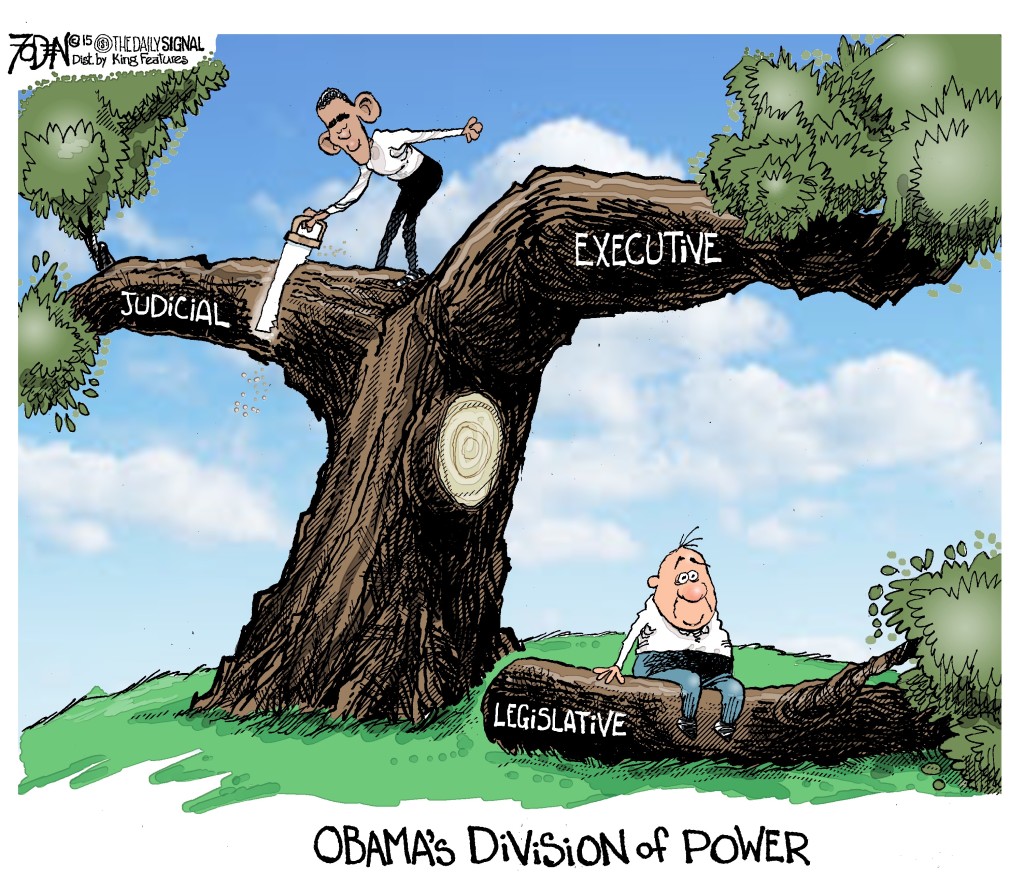Cartoon: Obama’s Division of Power
Glenn Foden /
Genevieve Wood wrote earlier this week on President Obama’s executive actions:
Many of President Obama’s executive actions—whether the most recent ones calling for more gun control or past ones extending amnesty to millions here illegally—are already being or will one day be challenged in the courts.
This is why it’s encouraging to see reports this week that lawmakers may finally make a real effort to checkmate the president’s proclivity to go around them and create laws on his own. It’s a strategy grassroots activists should demand.
Though Congress has given up much of its power when it comes to using its “power of the purse” to stop executive overreach, there is one power it still holds, and there is absolutely no reason not to use it. Article II, Section 2 of the U.S. Constitution, popularly known as “Advise and Consent,” requires the Senate to approve all presidential appointments of cabinet officials, ambassadors, and federal judges.
The day of the Senate “consenting” and following a go-along get-along strategy on such matters should be over. I don’t care which Republican senator is being pressured to get one of his buddies or constituents seated on a court or appointed to a high-ranking government position.
As my colleague at Heritage Action, CEO Mike Needham, said this week, “given the administration’s disregard for Congress’ role in our constitutional system of government, the Senate should refuse to confirm any more of the president’s judicial nominees.”
Amen.
Be prepared to hear from the left that this will cause a judicial crisis and from some weak-kneed Republicans that it’s not nice. Both arguments fall flat.
For one, as Heritage legal expert Elizabeth Slattery told me, “President Obama himself hasn’t really made judicial appointments a priority. He is ahead of President George W. Bush in terms of overall appointments at this point in their presidencies but slightly behind presidents Ronald Reagan and Bill Clinton.”
I guess when you view yourself as the creator and interpreter in chief of our country’s laws, who needs Congress, and who needs the courts?
Additionally, this past year had one of the lowest average vacancy rates in the past 25 years. A total of 91 percent of district and circuit courts are filled. There is no judicial crisis.
As to members of the GOP who find it hard to stand up to the president, it would be nice for a change if they would do that instead of going back on promises to their constituents to stop the president from doing end runs around the Constitution.
Checks and balances are what ensures that one person or one party or one branch of government can’t act as dictator. Yes, there are still ways Congress could use its power of the purse to “check” the president.
There are limits on how appropriated funds can be spent, but good luck getting the Obama administration to live within those.
Congress could pass a rescission bill (basically taking back the money it originally approved spending, and thereby try to prevent the president from using it to enforce his executive action on guns or amnesty), but Obama would veto it.
And while Congress could say it will not fund X or Y activity after the latest funding bill it just passed expires on September 30, that still gives Obama eight months between now and then to continue his imperial mischief.
Refusing to confirm any more of the president’s judicial nominees is something Senate Republicans can do immediately. No filibuster by Minority Leader Harry Reid or veto by Obama can stop them.
Republicans have no excuse not to use their power to prevent the president’s unlawful executive actions from becoming long-term assaults on the Constitution and the rights of American citizens.

